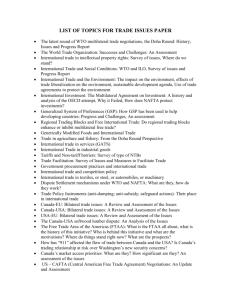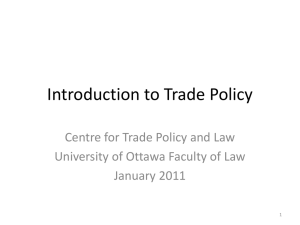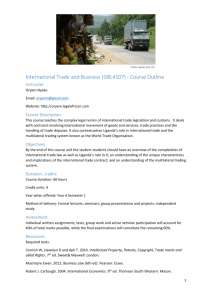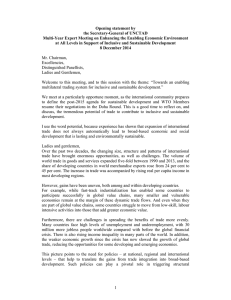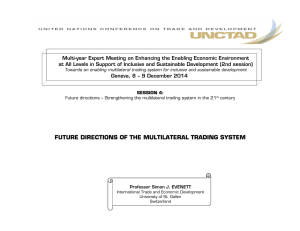executive summary and recommendations This Report examines
advertisement
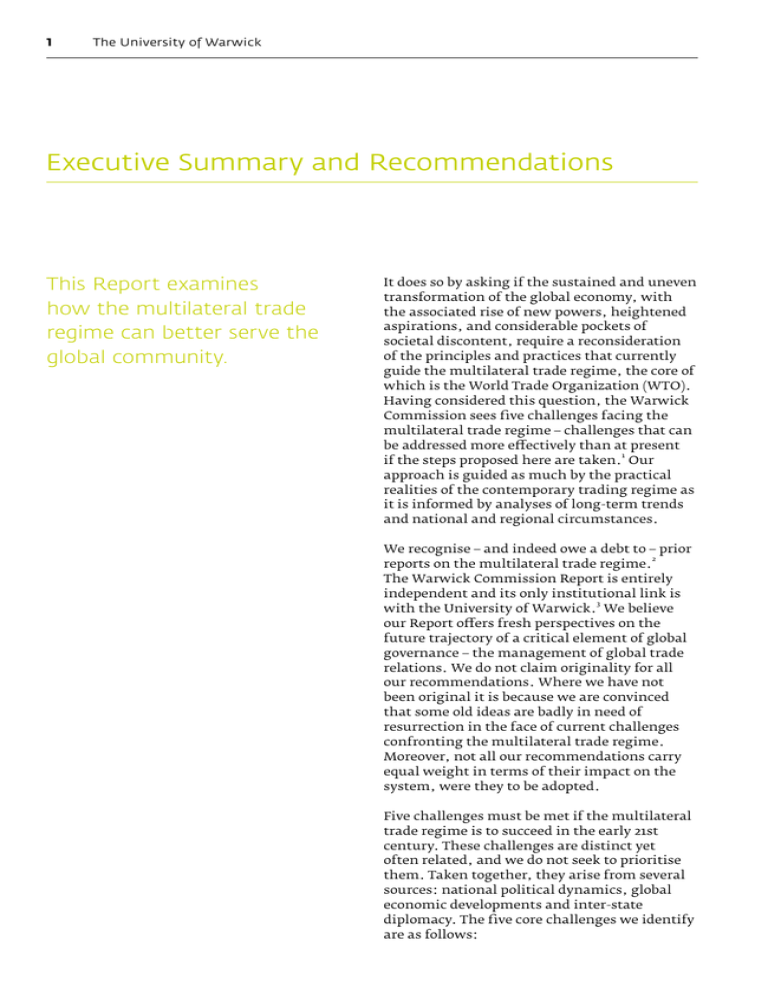
1 The University of Warwick Executive Summary and Recommendations This Report examines how the multilateral trade regime can better serve the global community. It does so by asking if the sustained and uneven transformation of the global economy, with the associated rise of new powers, heightened aspirations, and considerable pockets of societal discontent, require a reconsideration of the principles and practices that currently guide the multilateral trade regime, the core of which is the World Trade Organization (WTO). Having considered this question, the Warwick Commission sees five challenges facing the multilateral trade regime – challenges that can be addressed more effectively than at present 1 if the steps proposed here are taken. Our approach is guided as much by the practical realities of the contemporary trading regime as it is informed by analyses of long-term trends and national and regional circumstances. We recognise – and indeed owe a debt to – prior 2 reports on the multilateral trade regime. The Warwick Commission Report is entirely independent and its only institutional link is 3 with the University of Warwick. We believe our Report offers fresh perspectives on the future trajectory of a critical element of global governance – the management of global trade relations. We do not claim originality for all our recommendations. Where we have not been original it is because we are convinced that some old ideas are badly in need of resurrection in the face of current challenges confronting the multilateral trade regime. Moreover, not all our recommendations carry equal weight in terms of their impact on the system, were they to be adopted. Five challenges must be met if the multilateral trade regime is to succeed in the early 21st century. These challenges are distinct yet often related, and we do not seek to prioritise them. Taken together, they arise from several sources: national political dynamics, global economic developments and inter-state diplomacy. The five core challenges we identify are as follows: The Warwick Commission • The first challenge is to counter growing opposition to further multilateral trade liberalisation in industrialised countries. This tendency threatens to render further reciprocal opening of markets unduly limited and to weaken a valuable instrument of international economic cooperation. • That the bipolar global trade regime dominated primarily by the United States and Western Europe has given way to a multipolar alternative is now an established fact. The second challenge is to ensure that this evolving configuration does not lapse into longer term stalemate or worse, disengagement. • In this changing environment, the third challenge is to forge a broad-based agreement among the membership about the WTO’s objectives and functions, which in turn will effectively define the “boundaries” of the WTO. • The fourth challenge is to ensure that the WTO’s many agreements and procedures result in benefits for its weakest Members. This requires that the membership addresses the relationships between current trade rules and fairness, justice, and development. • The fifth challenge relates to the proliferation of preferential trading agreements and what steps can be taken to ensure that the considerable momentum behind these initiatives can be eventually channelled to advance the long-standing principles of non-discrimination and transparency in international commerce. An integrated, comprehensive and systemic response is called for; key elements of which are discussed in the Report. A recurring theme 2 in a number of our recommendations is the need for stakeholders in the trading system to permit themselves the time and space to take a step back from negotiating, litigating and running the daily business of trade policy in order to reflect on how they would like to see the trade regime evolve over the next few years. An inter-governmental ‘reflection exercise’ of this nature would seek to identify diverse needs and common interests, and to inject greater legitimacy, order and dynamism into the multilateral trade regime. Reflection and dynamism are not contradictory terms. An inter-governmental reflection exercise, we believe, would be best instigated sooner rather than later. A brief account follows of the contents of each chapter of this Report, together with the recommendations contained therein. This brief summary cannot, of course, substitute for the nuanced and more detailed reasoning in the Report. In laying out the contents and conclusions of the Report, the Commission also acknowledges that a Report of this nature cannot aspire to completeness. We have selected a range of issues we consider important, but we are acutely aware of many other issues in need of attention, related to trade but always with wider socio-political and economic ramifications. It is our hope that a reflection exercise of the kind we propose would be able to address some of these issues along with the ones we identify. Chapter 1 of the Report assesses the implications for the multilateral trading regime of the changing political and economic landscape both within nations and between them. Two striking observations, expressed as affirmations, relevant to policymakers follow from our analysis of the context facing the multilateral trading regime in the early 21st century. 3 The University of Warwick • Waning public support for the further opening of economies, which is particularly evident in many industrialised countries, now seriously threatens the conclusion of future trade agreements and the maintenance of orderly, rules-based international trade relations. National political leaders have often failed to explain adequately to the public what is at stake. Instead they have preferred silence, or worse, the politics of blame and responsibility avoidance. Governments must look beyond the electoral cycle and confront more directly the vested interests that benefit from protection and the inefficiency it breeds. Enhanced efficiency is, however, but one element in the equation of economic change. At the same time, governments must pay more serious attention to the distributional consequences of change. • Sustaining the WTO is the collective responsibility of all its Members, in particular both the longstanding and the new poles of power and influence in the world economy. The parties concerned must reach an accommodation and act upon their common interests, as failure to do so risks paralysis at the WTO and the de facto disengagement of some Members. While such efforts are clearly in the common interest, it will be the smallest and weakest members of the international community that would suffer most from this failure. Chapter 2 of this Report begins with a short discussion of the role of multilateral institutions in sustaining cooperation among nations. It then proceeds to examine decision-making in the WTO, with particular reference to agenda formation. The final part of the Chapter focuses on the WTO’s Dispute Settlement Mechanism (DSM). The specific recommendations of this Chapter relate to decision-making and dispute settlement. 1 It is no surprise that decisions about the reach and content of WTO rules have been among the most contentious issues in the sixty-year history of the multilateral trading system. The negotiating and rule-making priorities established within the WTO are a crucial determinant of how well the institution serves the interests of its diverse constituents. A core challenge is to shape the agenda in a way that both respects the interests of the entire membership while at the same time securing the continued commitment of all parties. In pursuit of this balance, the Commission recommends that consideration be given to the circumstances in which a “critical mass” approach to decision-making might apply. The key implication of this approach is that not all Members would necessarily be expected to make commitments in the policy area concerned. We are aware of the sensitivities inherent in this proposition and have taken care to spell out criteria that would need to be met in adopting such an approach. Among the criteria for considering a critical mass approach to defining the agenda are the need to identify a positive global welfare benefit, to protect the principle of non-discrimination, and to accommodate explicitly the income distribution effects of rule-making. 2 As far as dispute settlement is concerned, the Report has focused on those aspects of reform that could improve access to the procedures for the smaller and weaker Members of the WTO. In this connection, the Commission recommends that Members be given a right to the services of a Dispute Settlement Ombudsman whose role would be to mediate between potential disputants upon the request of one party at a stage prior to launching a formal complaint. Such a procedure would allow recourse to the good offices of an independent party prior to any formal bilateral consultations. 3 The Commission is aware of recent improvements that have been made in enhancing the transparency and accessibility of dispute settlement proceedings and recommends that these initiatives be sustained and strengthened, particularly in relation to hearings that are made open to the public and in allowing the submission of amicus curiae briefs before panels and the Appellate Body (AB). The Warwick Commission 4 One of the greatest successes of the WTO dispute settlement system, like that of the General Agreement on Tariffs and Trade (GATT) before it, has been the high degree of compliant behaviour by Members in respect of findings. Nevertheless, where Members neither comply nor offer compensatory trade policy action, the option for aggrieved parties to take retaliatory measures is neither attractive when seen against the objectives of the WTO Agreement nor feasible when small economies are pitted against large ones. In light of this, the Commission recommends that consideration be given to WTO Members accepting an obligation to provide cash compensation to aggrieved parties where compliance or traderelated compensation is not forthcoming. Reflecting the growing influence of developing countries in the WTO and the increasing importance attached to development and developing country concerns at the WTO, Chapter 3 of the Report is devoted to considering how the WTO might be reformed so as to benefit further its weakest Members. We note that the impact of the multilateral trade regime on developing countries is influenced by effective export opportunities, the choice of the negotiation set, the policy design of negotiated outcomes and the manner in which results are implemented. Following a short discussion of links between trade and development, the Report takes up the questions of Special and Differential Treatment (S&DT) and Aid for Trade (AfT). 5 Debate over S&DT provisions in the WTO has been contentious and over-politicised and the need for substantive analysis has often been neglected. Critics of S&DT provisions have characterised them as insensitive to diverse conditions in developing countries, often irrelevant to real development needs, and over-reliant on best-endeavour undertakings that are often disregarded. The Commission recommends that efforts be redoubled to design clear, concrete S&DT provisions based on solid analysis of development needs and cognisant of the reality that differing needs among developing countries call for differentiated measures. The Commission commends the 4 approach taken in the Doha negotiating mandate on trade facilitation, where the need for technical assistance and resource support to undertake new trade disciplines is linked to the ability do so. The Commission also believes that the systemic aspects of this issue should be taken up in the proposed reflection exercise. 6 The Commission notes the importance of increasing opportunities for developing countries to benefit from trade through improving physical infrastructure and human capital, modernising and streamlining administrative procedures, and strengthening trade-related regimes such as those dealing with product standards. The Commission applauds the AfT initiative and recommends that the respective responsibilities of the WTO, donor nations, potential recipient nations, and the other international organisations involved with this initiative be clearly delineated. Failure to identify the locus of respective responsibilities will weaken the effectiveness of AfT and heighten the risk that the WTO will be wrongly blamed for the lapses of others. Thus each party should be held accountable for its contribution to this initiative, which should stand apart from trade negotiations. Chapter 4 of the Report covers the relationship between multilateralism and regionalism, a topical but vital issue in today’s trading environment. Although the WTO remains the centre of gravity of the multilateral trade regime, the proliferation over the past 10-15 years of Preferential Trade Agreements (PTAs) has raised pressing questions about the quality of trade relations today and their likely future directions in what few would regard as a stable equilibrium. The Commission acknowledges that PTAs are here to stay, but is of the firm view that where feasible, the energy behind such initiatives should be channelled towards reinforcing accepted multilateral principles. We make three specific recommendations in this regard. 5 The University of Warwick 7 The Commission believes that the very rapid growth of PTAs in recent years has unnecessarily raised trade costs and carries worrying implications for the world trade regime in terms of stability, fairness, opportunity and coherence. The Commission therefore recommends that as part of a concerted response by governments to this situation, current efforts to clarify and improve disciplines and procedures in relation to WTO provisions on Regional Trade Agreements (RTAs) be intensified. 8 The Commission recommends that as an expression of their commitment to the multilateral trading system and of a willingness to provide leadership in maintaining and strengthening international trade arrangements for the benefit of all, the major industrialised countries should refrain from establishing PTAs among themselves. The Commission also believes that large developing countries with significant shares in world trade should similarly refrain from negotiating PTAs with each other. 9 The Commission recommends that WTO Members strengthen and make permanent the recently established Transparency Mechanism (TM) for reviewing RTAs. The Commission believes that this would provide crucial support for an urgently needed process of reflection, independent of negotiations, to consider how to manage the relationship between multilateral and regional trading arrangements. In this connection, the Commission recommends that consideration should be given to developing a mechanism that facilitates collective surveillance of RTAs and possibly the establishment of a code of best practices. The themes of this Report are drawn together very briefly in a concluding section. Given that the multilateral trading system is at a crossroads, the Commission perceives an urgent need for a reflection exercise to clarify and solidify the commitment of the international community to a healthy, vibrant and equitable multilateral trade regime. We believe that this reflection exercise should be open to all Members, should welcome inputs from other interested stakeholders and should examine the wide range of issues confronting the multilateral trade regime. The terms of reference of this reflection exercise should include, but go beyond, the issues covered in this Report. An emerging issue clearly in need of attention is the relationship between climate change and trade. In addition, we believe this process should give particular consideration to the manner in which the WTO’s surveillance and monitoring function could be further developed and given specific institutional form and support, so that this function can assume an importance comparable to the WTO’s legislative and judicial roles. 10The Commission therefore recommends that a process of reflection be established in the WTO, led by the Chairman of the General Council and/or the Director-General, to consider the challenges and opportunities facing the multilateral trading system and to draw up a plan of action to address them.
